| dc.contributor.author | El-Salhy, Magdhy | |
| dc.contributor.author | Gilja, Odd Helge | |
| dc.contributor.author | Hatlebakk, Jan Gunnar | |
| dc.date.accessioned | 2024-03-12T09:13:22Z | |
| dc.date.available | 2024-03-12T09:13:22Z | |
| dc.date.created | 2024-01-03T09:26:51Z | |
| dc.date.issued | 2023 | |
| dc.identifier.issn | 0036-5521 | |
| dc.identifier.uri | https://hdl.handle.net/11250/3121895 | |
| dc.description.abstract | Background
Faecal microbiota transplantation (FMT) performed with a proper protocol is a safe treatment for IBS that has high efficacy and durable effects. Females have been reported to respond better than males to FMT. The present study aimed at determining whether increasing the transplant dose or repeating FMT improve the responses of males to FMT.
Methods
This study included 186 IBS patients (131 females and 55 males) who were randomized at a 1:1:1 ratio to receive 90 g of donor faeces once into the large intestine, once into the small intestine or twice into the small intestine. Patients completed five questionnaires that assessed their symptoms and quality of life, and provided faecal samples at baseline and at 3, 6 and 12 months after FMT. The faecal bacterial profile and dysbiosis index were determined using 16S rRNA gene PCR DNA amplification covering variable genes V3–V9.
Results
The response rates to FMT at all observation times did not differ significantly between females and males regardless of the transplant administration route or whether it was repeated. Faecal Alistipes levels were higher in females than in males at baseline and increased in both females and males after FMT. In the repeated group, the Alistipes levels did not differ between females and males after FMT.
Conclusions
Increasing the transplant dose and repeating FMT results in the responses of male IBS patients to FMT reaching those of females regardless of the administration route. Alistipes spp. levels appear to play a role in this improvement. | en_US |
| dc.language.iso | eng | en_US |
| dc.publisher | Taylor & Francis | en_US |
| dc.rights | Navngivelse 4.0 Internasjonal | * |
| dc.rights.uri | http://creativecommons.org/licenses/by/4.0/deed.no | * |
| dc.title | Increasing the transplant dose and repeating faecal microbiota transplantation results in the responses of male patients with IBS reaching those of females | en_US |
| dc.type | Journal article | en_US |
| dc.type | Peer reviewed | en_US |
| dc.description.version | publishedVersion | en_US |
| dc.rights.holder | Copyright 2023 The Author(s) | en_US |
| cristin.ispublished | true | |
| cristin.fulltext | original | |
| cristin.qualitycode | 1 | |
| dc.identifier.doi | 10.1080/00365521.2023.2292479 | |
| dc.identifier.cristin | 2219549 | |
| dc.source.journal | Scandinavian Journal of Gastroenterology | en_US |
| dc.identifier.citation | Scandinavian Journal of Gastroenterology. 2023. | en_US |

